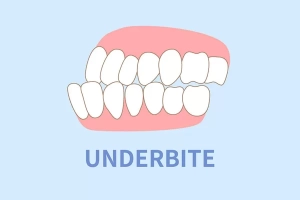Correct Your Underbite and Transform Your Smile With Invisalign Treatment
Do you experience difficulty chewing, biting, or speaking properly? You could have an underbite, a common condition that can negatively affect your smile and overall oral health.
Wondering if Invisalign fixes underbite? The answer is yes. Invisalign treatment can be effective for certain types of underbites, such as minor ones where the bottom teeth sit too far forward, and it can be part of a comprehensive treatment plan for more complex cases. Fortunately, Invisalign is a modern, discreet, and effective orthodontic treatment that can correct underbites and provide a healthier and more attractive smile.
Dr. Nathan Desai, a skilled and experienced dentist in Hilliard, OH, can offer personalized treatment plans that cater to your unique dental needs and help you achieve the beautiful, confident smile you deserve.
What Is an Underbite?
An underbite, also known as prognathism, is a type of malocclusion, or misalignment of the teeth. It’s characterized by the lower jaw (mandible) protruding or extending forward, causing the lower front teeth to overlap the upper front teeth when the mouth is closed.
This condition can lead to a range of problems if not treated, such as difficulties in speaking and eating, wear and tear on the teeth, potential self-esteem issues due to facial appearance, and chronic mouth breathing. Chronic mouth breathing, in particular, can lead to bad breath, a dry mouth, and further dental health issues.
Treatment options include orthodontics, jaw surgery, or a combination of both, depending on the severity of the underbite. It’s best to address this issue as early as possible, as treatment of severe underbite in children or teenagers can be easier due to their ongoing growth and development.
For some, an underbite can be treated with Invisalign. To learn more about Invisalign, contact our Hilliard dental office today to schedule your appointment.
What Causes an Underbite?
An underbite is primarily caused by an imbalance in the size or position of the upper jaw and lower jaw. The main factors that can contribute to an underbite include:
- Genetics: This is the most common cause of an underbite. If a person’s parents or close relatives have an underbite, it’s more likely that they will develop one too.
- Habits in early childhood: Certain habits in infancy or early childhood can also contribute to the development of an underbite. These include prolonged use of a pacifier or bottle, thumb-sucking, or excessive use of a sippy cup.
- Improper teeth position: Related to dental malocclusion, improper teeth position can lead to an underbite by causing a misalignment of the teeth.
- Tumors or growths: Abnormal growths or tumors in the jaw can lead to an underbite.
- Cleft palate or lip: These conditions can alter the structure of the mouth and jaw, leading to an underbite.
- Injuries: Trauma to the face, especially at a young age, can affect the growth and development of the jaw, potentially leading to an underbite.
- Poor dental health: Missing or extra teeth, or other dental problems, can impact the alignment of the teeth and jaw.
Benefits of Correcting Underbites
When you fix an underbite, you experience several benefits, including:
- Improved facial appearance
- Improved speech
- Better oral function
- Reduced risk of tooth decay and gum disease
- Prevention of future oral health problems
- Improved quality of life
- Reduced pain and discomfort
- Reduced risk of tooth extraction
How Does Invisalign Fix an Underbite?
Though severe underbites often necessitate jaw surgery due to the jawbone’s involvement, moderate and mild underbites can be effectively treated using Invisalign aligners. The custom-made clear aligners gradually move the lower teeth back and the upper teeth forward to address the misalignment, aiming to align the upper and lower jaws over time.
The Invisalign process begins with a consultation with Dr. Desai, who will evaluate your bite and create a custom treatment plan that addresses your unique needs and goals. They’ll create your custom plan by taking a 3D digital scan of your mouth.
Once your treatment plan is in place, you’ll receive a series of clear aligners that you’ll wear for about two weeks each. Each set of aligners will gently shift your teeth into the desired position, and you’ll return to Dr. Desai’s office every few weeks to ensure that your Invisalign treatment is progressing as planned.
For an underbite, special devices known as “precision cuts” may be incorporated with the aligners. These tiny slits in the aligner can accommodate elastics that help exert the necessary pressure to correct the underbite, providing extra assistance in moving the lower jaw back and the upper jaw forward.

Invisalign vs. Traditional Braces for Underbite Correction
One of the main benefits of Invisalign as a treatment option over traditional braces for treating an underbite is that Invisalign clear aligners are removable, allowing for better oral hygiene maintenance. This feature also makes it more comfortable for the wearer, as they can eat and drink without the hardware in their mouth, positioning Invisalign as a modern and patient-friendly alternative.
Another significant advantage is the aesthetic appeal. Invisalign’s clear aligners are almost invisible, making them an attractive option for teenagers and adults who are self-conscious about wearing traditional metal braces.
However, certain cases of underbites may require braces or even corrective jaw surgery. Your orthodontist will evaluate your condition and make the best treatment recommendation.
Frequently Asked Questions
Can an underbite cause health problems?
Yes, an underbite can cause health problems such as difficulty chewing, biting, and speaking properly. It can also cause jaw pain and increase your risk of developing tooth decay, gum disease, and temporomandibular joint (TMJ) disorders.
Can an underbite be hereditary?
Yes, an underbite can be hereditary. If one or both parents have an underbite, their child may be more likely to develop the condition.
Can an underbite be corrected without surgery?
Yes, an underbite can often be corrected without surgery through orthodontic treatments such as Invisalign or metal braces. However, in severe cases, surgery may be necessary to correct the misalignment of the bottom teeth.
Can an underbite be prevented?
In some cases, an underbite may be hereditary and cannot be prevented. However, some habits can contribute to the development of an underbite, such as thumb-sucking or prolonged pacifier use in childhood. Discouraging these habits in children may help prevent underbite.
Straighten Your Smile and Boost Your Confidence With Underbite Treatment
If you’re living with an underbite, you know how it can affect your confidence and overall quality of life. But you don’t have to suffer in silence. With treatments like Invisalign, we can help you achieve a straighter, more confident smile. Don’t wait any longer to take control of your dental health and happiness.
Contact our Hilliard dental team at (614) 771-6060 to schedule a consultation and take the first step towards a brighter, more beautiful smile. We welcome new and returning patients from Columbus, Dublin, Upper Arlington, Grove City, Westerville, and surrounding areas in Ohio.






